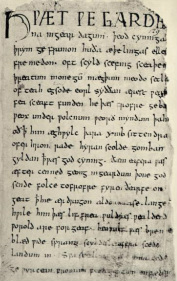II ENOCH MERILO PRAVEDNOE APOCRYPHAL FACTS The Gospel of Eve The Testaments of the Twelve Patriarchs (no text) The Life and Death of our Father Abraham the Just, Written According to the Apocalypse in Nice Words The Testament of Solomon (no text) The Apocryphon of Solomon, after Harnack (fragments) The Boy in the Tower. . Enoch, at 65, fathered Methuselah and also, over the years, a large posterity (see Gen. Enoch was 25 years old when Adam ordained him to the priesthood, and he was 65 when Adam again blessed him (see D&C 107:48). By his own voice, the Lord called Enoch, apparently at age 65, to be a prophet and seer (see Moses 6:25–27). There are also three pseudepigraphal books associated with Enoch's name that are not included in Scripture; the most common is 1 Enoch or the Book of Enoch. These books were likely based off oral tradition about Enoch passed down for generations before it was written. Interestingly, the first one is quoted in the book of Jude: 'It was also.
And Enoch also, the seventh from Adam, prophesied of these. The Revisers render it, and to these also Enoch... prophesied. In the apocryphal writing from which the passage is taken Enoch is styled, as here, 'the seventh from Adam.' Seven occurs in Scripture as a sacred symbolical number. Its introduction here, therefore, is very generally understood to claim a peculiar authority and finality for the prophecy emitted by Enoch. But it may be intended simply to mark the high antiquity of the prophecy, and its connection with the man who was distinguished from others of the same name mentioned in the oldest Scriptures (Genesis 4:17; Genesis 25:4; Genesis 46:9) by his exceptional nearness to God. Saying, Behold the Lord cometh (literally, came) with ten thousands of his saints, to execute judgment upon all, and to convince (that is, to convict) all that are ungodly among them of all their ungodly deeds which they have ungodly committed, and of all their hard speeches (or, with the Revised Version, all the hardthings) which ungodly sinners have spoken against him. The 'ten thousands of his saints' is better rendered 'ten thousands of his holy ones,' or, as the Revised Version gives it in the margin, 'his holy myriads.' For the 'holy ones' here intended are the angels. The mention of this retinue of Jehovah is in accordance with the Hebrew idea which appears in such passages as Deuteronomy 33:2, 3; Daniel 7:10; Zechariah 14:5 (where the better reading is, 'and the holy ones with him'); and appears again in the New Testament (Matthew 25:31; 2 Thessalonians 1:7, etc.). The clause, 'among them,' which might limit the ungodly to those in Israel, is omitted by the best authorities. The epithet 'hard,' which is applied to the 'speeches,' means hard in the sense of 'harsh,' not in the sense of 'difficult to understand.' It is the 'churlish' which is applied to Nabal (1 Samuel 25:3). In the original the whole emphasis of the sentence is on the 'ungodly sinners,' which words are thrown forward to the close, thus: 'all the hard things which they uttered against him - these impious sinners!' Near the beginning of that remarkable specimen of ancient apocalyptic literature, the Book of Enoch (chapter 1:9), we find these words, 'And behold, he comes with myriads of the holy, to pass judgment upon them, and will destroy the impious, and will call to account all flesh for everything the sinners and the impious have done and committed against him' (Schodde's rendering). This is the passage which Jude quotes. He does so, however, with some modification; for the original, as we now have it, does not contain any reference to the 'hard speeches' of the men of impiety. The book itself has had a singular history. Some acquaintance with it is discovered as early as the 'Epistle of Barnabas,' the 'Book of Jubilees,' and the 'Testament of the Twelve Patriarchs.' It was freely used by the Fathers of the first five centuries. Though never formally recognized as canonical, it was in great esteem, largely accepted as a record of revelations, and regarded as the work of Enoch. It disappeared after Augustine's time, the only traces of its existence being some references to it in the writings of Syncellus and Nicephorus. From this time (about A.D. ) it was entirely lost sight of till rather more than a century ago, when the Abyssinian Church was discovered to possess an Ethiopic version of it. The well-known traveler, Bruce, obtained three copies of this version in 1773, and in 1821 an English translation was published by Archbishop Laurence. This was followed by a German translation by Hoffmann in 1833. The Ethiopic text itself was first issued by Archbishop Laurence in 1838, and afterwards in most scholarly fashion by Dillmann, in 1851, who also published a new German translation with important emendations in 1853. Since then much attention has been paid to the book. Within the last few years a corrected edition of Laurence's English translation has been published by the author of the 'Evolution of Christianity' (Kegan Paul and Co., 1881); while another edition, with an English translation and important explanatory matter, has been issued by Professor Schodde of Ohio (Andover, 1882). An attempt has been made by some to bring the composition of the book down to Christian times, so that Enoch should quote Jude, not Jude Enoch. But there is every reason to believe that it belongs to the second century B.C. Certain portions of the book, however, are of later date. For it is scarcely possible to deny that it is the work of more than one hand. The original seems to have been written in Hebrew or Aramaic. We cannot be far astray, therefore, in accepting it as the composition of a Jew of Palestine dating between B.C. 166 and 110. It professes to give a series of revelations or visions received by Enoch, in which the fall of the angels, the punishment of unrighteous men, the reward of the godly, the coming of Messiah, the mystery of the world-weeks, and the secrets of the kingdom of nature, as well as those of the kingdom of grace, are shown him. That such a book should have been ascribed to Enoch is not strange. It was suggested by the account which is given of him in Genesis 5:21-24. 'The statements there left ample room,' as Dr. Schodde well remarks, 'for a vivid imagination to supply unwritten history, while antiquity and piety made Enoch a welcome name to give force and authority to a book, and the 'walking with God' of Enoch, and his translation to heaven, which correct exegesis has always read in this passage, founded his claim of having enjoyed close communion with God and having possessed superhuman knowledge.'
occurs in Scripture as a sacred symbolical number. Its introduction here, therefore, is very generally understood to claim a peculiar authority and finality for the prophecy emitted by Enoch. But it may be intended simply to mark the high antiquity of the prophecy, and its connection with the man who was distinguished from others of the same name mentioned in the oldest Scriptures (Genesis 4:17; Genesis 25:4; Genesis 46:9) by his exceptional nearness to God. Saying, Behold the Lord cometh (literally, came) with ten thousands of his saints, to execute judgment upon all, and to convince (that is, to convict) all that are ungodly among them of all their ungodly deeds which they have ungodly committed, and of all their hard speeches (or, with the Revised Version, all the hardthings) which ungodly sinners have spoken against him. The 'ten thousands of his saints' is better rendered 'ten thousands of his holy ones,' or, as the Revised Version gives it in the margin, 'his holy myriads.' For the 'holy ones' here intended are the angels. The mention of this retinue of Jehovah is in accordance with the Hebrew idea which appears in such passages as Deuteronomy 33:2, 3; Daniel 7:10; Zechariah 14:5 (where the better reading is, 'and the holy ones with him'); and appears again in the New Testament (Matthew 25:31; 2 Thessalonians 1:7, etc.). The clause, 'among them,' which might limit the ungodly to those in Israel, is omitted by the best authorities. The epithet 'hard,' which is applied to the 'speeches,' means hard in the sense of 'harsh,' not in the sense of 'difficult to understand.' It is the 'churlish' which is applied to Nabal (1 Samuel 25:3). In the original the whole emphasis of the sentence is on the 'ungodly sinners,' which words are thrown forward to the close, thus: 'all the hard things which they uttered against him - these impious sinners!' Near the beginning of that remarkable specimen of ancient apocalyptic literature, the Book of Enoch (chapter 1:9), we find these words, 'And behold, he comes with myriads of the holy, to pass judgment upon them, and will destroy the impious, and will call to account all flesh for everything the sinners and the impious have done and committed against him' (Schodde's rendering). This is the passage which Jude quotes. He does so, however, with some modification; for the original, as we now have it, does not contain any reference to the 'hard speeches' of the men of impiety. The book itself has had a singular history. Some acquaintance with it is discovered as early as the 'Epistle of Barnabas,' the 'Book of Jubilees,' and the 'Testament of the Twelve Patriarchs.' It was freely used by the Fathers of the first five centuries. Though never formally recognized as canonical, it was in great esteem, largely accepted as a record of revelations, and regarded as the work of Enoch. It disappeared after Augustine's time, the only traces of its existence being some references to it in the writings of Syncellus and Nicephorus. From this time (about A.D. ) it was entirely lost sight of till rather more than a century ago, when the Abyssinian Church was discovered to possess an Ethiopic version of it. The well-known traveler, Bruce, obtained three copies of this version in 1773, and in 1821 an English translation was published by Archbishop Laurence. This was followed by a German translation by Hoffmann in 1833. The Ethiopic text itself was first issued by Archbishop Laurence in 1838, and afterwards in most scholarly fashion by Dillmann, in 1851, who also published a new German translation with important emendations in 1853. Since then much attention has been paid to the book. Within the last few years a corrected edition of Laurence's English translation has been published by the author of the 'Evolution of Christianity' (Kegan Paul and Co., 1881); while another edition, with an English translation and important explanatory matter, has been issued by Professor Schodde of Ohio (Andover, 1882). An attempt has been made by some to bring the composition of the book down to Christian times, so that Enoch should quote Jude, not Jude Enoch. But there is every reason to believe that it belongs to the second century B.C. Certain portions of the book, however, are of later date. For it is scarcely possible to deny that it is the work of more than one hand. The original seems to have been written in Hebrew or Aramaic. We cannot be far astray, therefore, in accepting it as the composition of a Jew of Palestine dating between B.C. 166 and 110. It professes to give a series of revelations or visions received by Enoch, in which the fall of the angels, the punishment of unrighteous men, the reward of the godly, the coming of Messiah, the mystery of the world-weeks, and the secrets of the kingdom of nature, as well as those of the kingdom of grace, are shown him. That such a book should have been ascribed to Enoch is not strange. It was suggested by the account which is given of him in Genesis 5:21-24. 'The statements there left ample room,' as Dr. Schodde well remarks, 'for a vivid imagination to supply unwritten history, while antiquity and piety made Enoch a welcome name to give force and authority to a book, and the 'walking with God' of Enoch, and his translation to heaven, which correct exegesis has always read in this passage, founded his claim of having enjoyed close communion with God and having possessed superhuman knowledge.' Parallel Commentaries ...
Ἑνὼχ(Henōch)
Noun - Nominative Masculine Singular
Strong's Greek 1802: Enoch, son of Jared and father of Methuselah. Of Hebrew origin; Enoch, an antediluvian.
[the] seventh
ἕβδομος(hebdomos)
Adjective - Nominative Masculine Singular
Strong's Greek 1442: Seventh. Ordinal from hepta; seventh.
from
ἀπὸ(apo)
Preposition
Strong's Greek 575: From, away from. A primary particle; 'off, ' i.e. Away, in various senses.
Adam,
Ἀδὰμ(Adam)
Noun - Genitive Masculine Singular
Strong's Greek 76: Adam, the first man, the first parent of the human race. Of Hebrew origin; Adam, the first man; typically man.
also
καὶ(kai)
Conjunction
Strong's Greek 2532: And, even, also, namely.
prophesied
Προεφήτευσεν(Proephēteusen)
Verb - Aorist Indicative Active - 3rd Person Singular
Strong's Greek 4395: From prophetes; to foretell events, divine, speak under inspiration, exercise the prophetic office.
about them:
τούτοις(toutois)
Demonstrative Pronoun - Dative Masculine Plural
Strong's Greek 3778: This; he, she, it.
“Behold,
Ἰδοὺ(Idou)
Verb - Aorist Imperative Active - 2nd Person Singular
Strong's Greek 2400: See! Lo! Behold! Look! Second person singular imperative middle voice of eido; used as imperative lo!

[the] Lord
Κύριος(Kyrios)
Noun - Nominative Masculine Singular
Strong's Greek 2962: Lord, master, sir; the Lord. From kuros; supreme in authority, i.e. controller; by implication, Master.
is coming
ἦλθεν(ēlthen)
Verb - Aorist Indicative Active - 3rd Person Singular
Strong's Greek 2064: To come, go.
with
ἐν(en)
 Preposition
PrepositionStrong's Greek 1722: In, on, among. A primary preposition denoting position, and instrumentality, i.e. A relation of rest; 'in, ' at, on, by, etc.
myriads
μυριάσιν(myriasin)
Noun - Dative Feminine Plural
Strong's Greek 3461: A myriad, group of ten thousand, a ten thousand. From murioi; a ten-thousand; by extension, a 'myriad' or indefinite number.
of His
αὐτοῦ(autou)
Personal / Possessive Pronoun - Genitive Masculine 3rd Person Singular
Strong's Greek 846: He, she, it, they, them, same. From the particle au; the reflexive pronoun self, used of the third person, and of the other persons.
holy [ones]
ἁγίαις(hagiais)
Ii Enoch Merilo Pravednoerejected Scriptures Bible
Adjective - Dative Feminine Plural
Strong's Greek 40: Set apart by (or for) God, holy, sacred. From hagos; sacred.
AdamAmidstAttendedBelongedEnochExecuteGenerationHolyJudgementMyriadsOnesProphesiedProphesyProphetSaintlySaintsSeventhTenTensThousands
Jude 1:14 NLT
Jude 1:14 ESV
Jude 1:14 NASB
Jude 1:14 KJV
Ii Enoch Merilo Pravednoerejected Scriptures Verses
Jude 1:14 BibleApps.comIi Enoch Merilo Pravednoerejected Scriptures Study
Jude 1:14 Biblia ParalelaJude 1:14 Chinese Bible
Ii Enoch Merilo Pravednoerejected Scriptures Verse
Jude 1:14 French BibleJude 1:14 Clyx Quotations
NT Letters: Jude 1:14 About these also Enoch the seventh (Jud. Ju Jd)
